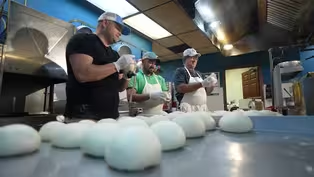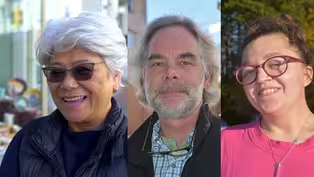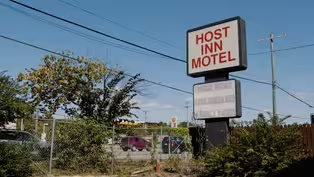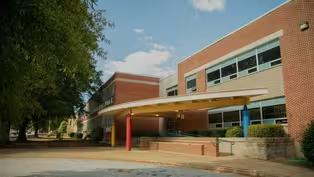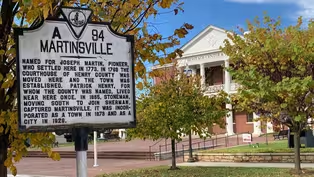VPM News Focal Point
After COVID | November 09, 2022
Season 1 Episode 15 | 26m 46sVideo has Closed Captions
How Covid changed work; hotels as shelters of last resort, Silver linings and new careers
How has Covid changed the way Virginians work?; hotels are now a shelter of last resort for many statewide - how did we get here? Silver linings and new careers after Covid.
Problems playing video? | Closed Captioning Feedback
Problems playing video? | Closed Captioning Feedback
VPM News Focal Point is a local public television program presented by VPM
The Estate of Mrs. Ann Lee Saunders Brown & Dominion Energy
VPM News Focal Point
After COVID | November 09, 2022
Season 1 Episode 15 | 26m 46sVideo has Closed Captions
How has Covid changed the way Virginians work?; hotels are now a shelter of last resort for many statewide - how did we get here? Silver linings and new careers after Covid.
Problems playing video? | Closed Captioning Feedback
How to Watch VPM News Focal Point
VPM News Focal Point is available to stream on pbs.org and the free PBS App, available on iPhone, Apple TV, Android TV, Android smartphones, Amazon Fire TV, Amazon Fire Tablet, Roku, Samsung Smart TV, and Vizio.
Providing Support for PBS.org
Learn Moreabout PBS online sponsorshipANGIE MILES: What's changed since you first heard about COVID-19?
How is your life different?
We'll explore the before and after of the pandemic in this program.
Specifically, the world of work is transformed in many ways and in part two of our Hotel Housing series, we'll find that for some, a place to call home has become a problem without a good solution.
For others, the losses of COVID were accompanied by the joys of new beginnings.
You're watching "VPM News Focal Point."
Production funding for VPM News Focal Point is provided by Dominion Energy, dedicated to reliably delivering clean and renewable energy throughout Virginia.
Dominion Energy, Actions Speak Louder.
The estate of Mrs. Ann Lee Saunders Brown.
And by... ♪ ♪ ANGIE MILES: Welcome to "VPM News Focal Point."
I'm Angie Miles.
In this episode, we're looking at how the pandemic changed Virginia and Virginians and how those changes might inform our future.
First, though, a recap of the biggest news of the week, mid-term elections.
Here's what happened in key races around the state.
It was a good night for the incumbents.
Representatives Wittman, Scott, McEachin, Good, Cline, Beyer, Griffith and Connolly all held onto their seats.
The Virginia delegation now has six Democrats and five Republicans.
Taking a closer look at the state's most closely watched races.
In the seventh district, Abigail Spanberger won over Republican challenger Yesli Vega.
Then further south in the second district, in the only upset of the night, Representative Elaine Luria lost to state Senator Jen Kiggans by four percentage points.
In the Northern Virginia suburbs 10th District, Jennifer Wexton won by nearly 6% of the vote against Hung Cao.
We spoke with the University of Richmond law professor Henry Chambers about the results.
HENRY CHAMBERS: Virginia is voting pretty much as it's voted in the past.
With so many incumbents winning, it looks as though things haven't really changed that much in Virginia.
So we'll see what happens when all the votes are in, but it doesn't look like Virginia's congressional delegation's going to change very much.
ANGIE MILES: State election officials will spend the next few days verifying those results to provide a final tally.
We also spoke with Professor Chambers about counting absentee ballots and concerns regarding election fraud.
HENRY CHAMBERS: given where we are right now, it looks like the delta between the winner and the loser is so large that the absentees probably aren't going to be that big a deal.
You can guarantee you're going to hear some complaints about what's going on but frankly, it's just normal election things that occur in the first couple days after the election day is over.
ANGIE MILES: Now Virginians turn their attention to 2023 when voters will select their representatives in the State General Assembly.
Currently, Democrats control the Senate and Republicans control the House.
ANGIE MILES: When we asked people of Virginia about their lives during the pandemic, some went immediately to the good things they experienced.
BLAIR CISCO: The roads being open and not a lot of traffic going out.
JAMON REVELY: I had my son, my one and only son, in the pandemic.
BETH BERNHARDT: I think, in general, with family, friends, and work, I think we all got a little closer, although it was, you know, via Zoom or whatever way you're doing your social distancing, we got a little closer.
FRANK STRASSLER: My wife and I actually enjoyed being able to be at home, to be able to engage in some home projects, things like that, to slow work down a bit.
We had all gotten in this rhythm of work, work, work, go, go, go calendar, calendar, calendar.
COVID reset a lot of what we do and I think that was healthy.
ANGIE MILES: But people were honest about what they missed as well.
BLAIR CISCO: Because of the pandemic, I had no prom, no graduation, and I had COVID right there at Halloween.
LATOSHA MABINS: Being that I travel when I work, so I stay in hotels and stuff, and just having to go all over the place, a lot of stuff was closed off and people still not getting back to it.
WARREN REVELY: Being with my friends and family.
We all like to get together on the weekends, have big dinners.
We couldn't do that because of the pandemic.
So that was, that was challenging.
That was really challenging.
STEPHANIE JOHNSON: I think the hardest thing was probably children that were out of school and my first grader having to do virtual first grade for most of the year.
ANGIE MILES: One thing that employers are missing since the pandemic started is workers.
Across industries, workers are in high demand and short supply.
Healthcare, education and childcare have severe shortages, but few businesses are feeling the effects as much as hospitality services such as hotels, theaters and restaurants.
ANGIE MILES: 28-year-old Salvatore Volo learned the art of cooking from his father.
SALVATORE VOLO: I would sit on the shelf above the pizza station and just watch him make pizzas and eventually just started making pizzas on my own.
ANGIE MILES: In this very building.
SALVATORE VOLO: Yep, in this very building.
WOMAN: Thanks for calling Anna's Pizza in Warsaw, how can I help you?
ANGIE MILES: Anna's Pizza in Warsaw is like a second home, one of the family's many restaurant businesses.
James Fogarty and Mike Francesca have been running things for the past four years, weathering the pandemic together.
JAMES FOGARTY: My wife is from Sicily so Italy got affected really, really bad first, so we kind of knew it was about to happen here.
My father-in-law stocked up on sanitizers and all kinds of stuff.
Luckily we were able to get a couple different loans that we didn't fire or lay off any employees.
We were allowed to pay them hourly and they just answered the phones and we would do takeout where they would come in or we would take it out curbside.
ANGIE MILES: Fogarty says Anna's worked with the town and Meals on Wheels to provide food for older residents but as the pandemic has receded... JAMES FOGARTY: Staffing has been really bad.
ANGIE MILES: Which makes Fogarty thankful for the staff he has.
Everywhere, unemployment is low and in Virginia, the workforce is growing.
The state added more than 8,000 people to payrolls in September, according to the Federal Reserve, which says there are three job openings for every person looking for employment in the state.
Construction grew fastest while hospitality employers like restaurants continue to lose employees.
So where are all the workers?
JAMES FOGARTY: People were pretty much getting paid and I don't blame them.
They were getting paid unemployment to not work, so that really affected us.
ANGIE MILES: Throughout Warsaw, restaurants report severe staffing shortages.
Some like the Daily might have shortened hours or have staff work more hours to continue serving customers well.
Some workers decided during the pandemic to just stay home, rather than pay for childcare and other costs of doing business.
Some got by for a long time on stimulus money or enhanced unemployment benefits.
Others decided to make big changes in how they earn a living.
NATALIE FOSTER: Virginia Ready was created in June of 2020, really looking at the employment disruption that was going on during the pandemic and what could be a solution, and one of those was to rapidly reskill or upskill Virginians for in-demand jobs in healthcare, cybersecurity, technology, in the manufacturing and trades.
They take a class through Virginia's Community Colleges Fast Forward program.
ANGIE MILES: To date, Virginia Ready has assisted more than 3,000 Virginians in completing job training paying each Virginia Ready Scholar $1,000 for earning a certificate and connecting them with waiting employers.
Some have become welders, others CDL-credentialed truck drivers.
Some scholars have entered the medical field.
There are numerous different skilled labor opportunities.
NATALIE FOSTER: We have business partners that are ready there to interview them for potential family-sustaining wage.
ANGIE MILES: And other opportunities are looming.
President Biden's American Rescue Plan is working with states and localities to infuse billions of dollars into jobs and workforce development.
1.7 million of that is expected to yield 30 new jobs in Warsaw, Virginia, as the Richmond County Commerce Park expands, just a few miles from Anna's Pizza, where James Fogarty is sure that staff-strapped restaurants will find a way forward.
JAMES FOGARTY: People are definitely want to come and go out and they can't just stay at home, like mental wellbeing, right?
So people are going to still come out and eat.
ANGIE MILES: Fogarty says he's always tried to pay staff well, but for now, the most reliable workforce for restaurants may be those who see hospitality is a valued way of life.
ANGIE MILES: Virginia Ready is a nonprofit started Governor Glenn Youngkin and his wife Suzanne in 2020 before Youngkin became Governor.
VPM News Focal Point is interested in the points of view of Virginians.
To hear more from your Virginia neighbors, and to share your own thoughts and story ideas, find us online at vpm.org/focalpoint.
ANGIE MILES: Richmond rental prices have risen more than 20% since the start of the COVID-19 pandemic, worsening the affordable housing crisis.
Now that relief funds have dried up, volunteers like Sandra Witherspoon are all that keep some Richmond families from going hungry or sleeping on the streets.
Meet Sandra and the people she serves in part two of our special report on hotel housing produced by our Samantha Willis and Mark Robinson, a fellow with the Economic Hardship Reporting Project.
SANDRA WITHERSPOON: Hey, sweet pea.
I'm sorry I'm a little later than I thought.
How are you, sunshine?
Look at them toenails!
So I didn't have any brownies, but I brought you Froot Loops, that's sugary.
WOMAN 1: Yeah.
SANDRA WITHERSPOON: Yeah, so I got that.
And do you want any coffee?
I'm Sandra Witherspoon and I founded RVA Humble Beginnings, which is an organization that provides anything to anybody anytime, anywhere.
Bread, do you need bread?
WOMAN 1: Yeah, one loaf.
SANDRA WITHERSPOON: All right, how about butter bread, butter white bread?
WOMAN 1: Yeah, yeah.
SANDRA WITHERSPOON: Yeah, yeah, you want some socks?
I serve the homeless.
I also serve the hopeless.
These are people who maybe they have an apartment, maybe they have a house, but they just don't have enough resources.
I forgot, I've got hats.
Do you need a beanie hat?
WOMAN 1: A beanie hat, it's getting cold, yeah.
ERIC LEABOUGH: So there are a number of challenges that we're facing post-COVID.
The biggest challenge across the country is affordability.
Rental rates are sky high, so people are having challenges.
Even people that are in rental housing, they're seeing 2, 3, $400 increases in their rent.
MARK ROBINSON: We've seen more families turning to hotels and motels as a form of long-term housing.
On top of that, those same people are facing a cost of living crisis.
Inflation has gone up almost 10% this year and that's made the cost of basic necessities so much more expensive and it's stretched those budgets even further than they were before.
ERIC LEABOUGH: We are getting phone calls from people in the community that need help and they're at their wits end.
With our department, we fund a number of service providers to prevent people from ending up needing to live in a hotel.
So we have rapid rehousing programs that we fund.
We fund McKinney-Vento program that helps families with school-age children who are living in hotels get connected to permanent housing.
And I'll be candid, we can't always help.
SANDRA WITHERSPOON: We are getting ready to deliver items to people who are staying in the hotels on Midlothian Turnpike.
So these folks are homeless, they are in programs.
And so the organization that they are with is putting them up in a hotel, but doesn't necessarily provide them with the food and things that they need, or enough food.
If they do provide food, they don't provide enough.
So we're supplementing that, primarily food, but I also provide clothing, shoes, other items that they may need.
KRISTIN RIDDICK: So a lot of the families that come through our program, especially ones that are staying at hotels, they don't have access to the traditional homeless services system.
Those are reserved for families that are sleeping on the streets, sleeping in their car or in a condemned building or any other place not meant for habitation.
MARK ROBINSON: During the pandemic, there was a lot of resources set aside for people in these situations.
There was rent relief, there was the child tax credit, there was some supplemental SNAP benefits.
Most of those have expired and gone away.
And so those safeguards are gone now.
SANDRA WITHERSPOON: This, instead of giving you paper plates and napkins, I gave you some plates you can use.
WOMAN 2: Oh, wonderful.
SANDRA WITHERSPOON: And there's some silverware in there.
WOMAN 2: Okay.
SANDRA WITHERSPOON: Just so you wouldn't have to have all the disposable stuff.
WOMAN 2: Right... SANDRA WITHERSPOON: So for individuals that are in hotels, I try to provide them with dishes, with silverware, with a George Foreman grill or a Crockpot or some pots or something so that they can cook because a lot of the hotels do not have microwaves.
These are hotels that should have microwaves, but for whatever reason, they don't work.
Do you need any coffee or utensils?
WOMAN 3: Utensils.
SANDRA WITHERSPOON: Yeah, now, I have some silverware in here for you.
Okay, so the folks who I service in the hotels, I ask them to contact me before noon on Thursdays.
I write their names down and what they need and then I just start packing them.
I used to do it, like if I had 10 people, I would put a can of corn in each bag and everybody gets the same thing.
But when you start to learn people, you know what their preferences are.
And so now I pack them individually.
So somebody might want cookies or crackers, another person might like mandarin oranges.
And so I try to pack it like that.
Everything that you see in here has been donated and it goes out free.
There's no charge at all.
Looks like we're good.
MISCHE BLAKELY: Sandy Witherspoon is literally our savior.
MATT SPROUSE: An angel.
MISCHE BLAKELY: Yeah, she's our savior.
Without her, we probably wouldn't be living here 'cause we'd be spending astronomical amounts on food to feed the five of us.
She comes every week on Thursdays and she gives us pretty much anything that we ask for.
We text her by Monday or Tuesday each week and she brings it to us.
MATT SPROUSE: All right, so these are the bags we get from Ms. Witherspoon and she always puts our name on it.
They have multiple things inside, stuff like crackers, snacks for the kids, noodles, pastas.
MISCHE BLAKELY: If it wasn't for Sandy and all the support she's provided us with food, there are times that we're most likely wouldn't have eaten and there's times where we haven't eaten for a couple of days.
SANDRA WITHERSPOON: You can take as much bread as you want.
MAN 1: That's what I need.
SANDRA WITHERSPOON: Okay, and this is utensils and salt.
KRISTEN RIDDICK: With the SNAP benefits, the extra SNAP benefits from COVID, since they are now gone, families are having to rely a lot more on nonprofits to get any kind of food to put on the table.
They are a lot more visitors to food pantries these days.
There are a lot more people looking for hot meals.
SANDRA WITHERSPOON: So at the beginning of the year, I had maybe five individuals in the hotels contacting me, but as those five started talking to other people, it started to grow.
And so now typically on a Thursday, is when I do deliveries, I usually have at least 28 people that I'm servicing.
KRISTIN RIDDICK: With the food and the gas price increases, there has been less to go around for rent or a hotel stay.
So a lot of times, families are having to make difficult choices between paying for gas to get to their job or putting food on the table or saving up for a deposit or paying their rent.
It's put families in a really tough spot financially.
SANDRA WITHERSPOON: If we weren't providing these services, I do not believe people's needs would be met.
Primarily because these people are getting services and it's not running through the entire month.
By the middle of the month, they need help, they need food, they need assistance.
And so I really believe that if we weren't out there helping, they wouldn't get it.
ANGIE MILES: Local organizations keep filling the gaps for families in need and some provide pathways to housing help.
Many of the families that these groups serve include school-aged children who reports show have been seriously impacted by the pandemic.
A new National Association of Educational Progress report shows that American students and Virginia students especially had sharp declines in reading and math.
Virginia's education leaders just launched the Bridging the Gap Learning Loss Recovery Plan.
We spoke with Jillian Balow, State Superintendent of Public Instruction to learn more.
Here's an excerpt.
ANGIE MILES: We know that when the scores came out, many people were dismayed, Governor Youngkin announced plans for a full-fledged recovery statewide, but Bridging the Gap is one part of that that really had already begun.
JILLIAN BALOW: So We all know that the learning loss is great, that was kind of doubled down on with the release of the Nation's Report Card or our NAEP scores a couple of weeks ago.
Virginia saw steep declines in both reading and math.
And that was also evident in our early reading data as well as our SOL data.
And so, one of the most important aspects of Bridging the Gap is making sure that we truly know where our students are.
And the best way to do that is to transparently share data and to be able to transparently share data, We have to have it.
And sometimes that needs to all be in one place, which is what Bridging the Gap does.
ANGIE MILES: In addition to the data, again, which is crucial really and smart educators know to look at the data, but in addition to that, testing assessments and data alone are not necessarily going to get us where we want to be, right?
I mean, what other supports are part of Bridging the Gap or are being done apart from Bridging the Gap to really help people with that learning loss that we're experiencing?
JILLIAN BALOW: Yeah, Angie, that is such an important question and I hope every single person in Virginia asks that question because what we know is that parents are the most important teachers in a child's life.
And there are really three pieces to the Bridging the Gap pilot.
It is where are our students right now as a result of COVID 19 and or other learning losses?
What are we going to do about that and what are the opportunities for both parents and teachers to respond to that?
The great thing about the Bridging the Gap pilot is that we are are partnered with a national organization to provide a report card so to speak, or a report of data.
No new tests will be administered, it's data that already exists but it will really give a good estimation of where a student is academically and where they need to be to be on track for grade level proficiency.
That will be communicated to both teachers and to parents and then teachers and parents can work together on providing interventions and instruction to make sure that the child is on the trajectory to be successful at grade level in school and in life.
find us online at vpm.org/focalpoint.
ANGIE MILES: Martinsville is a town with fewer than 14,000 and it's experiencing a boom with 50 businesses opening or expanding since the pandemic began.
VPM multimedia journalist Adrienne McGibbon spoke with some of the entrepreneurs who made a fresh start during COVID.
(dog barking) SIERRA FULCHER: I am a co-owner of Barking Beauties here in Martinsville, Virginia.
Right when COVID hit, we were both working at a corporate grooming shop together here in Martinsville.
That's where we met each other.
The regulations and restrictions that the corporate had put us in a restraint that we felt like it was best for us to move out and kind of start our own business.
There were a lot of businesses that were interested in moving in the area, and it's kind of upcoming, a lot of young and new businesses, and we were excited that we found a place here in Uptown that we could join them.
LISA WATKINS: So since February of 2020, we've had quite an interest in entrepreneurship within the city limits.
So we've had over 48 businesses either start or expand since February, 2020.
SAMANTHA TURNER: In 2021, that's kind of when this private practice business came about.
I think, during COVID, we learned a whole lot about health.
You know, we kind of saw a surge in unhealthy eating behaviors and also like an increase in other chronic diseases like heart disease and diabetes and things like that.
So my business is called Oak Stone Health and Nutrition.
I'm a registered dietician, and that's why I started the business to fill some gaps in the community and bring some more nutrition services to the area.
AUSTIN WHITE: Just before Covid, we actually owned another store just across the street, it was an antique store.
We were in the store for about a month and a half, and then COVID hit so it was very hard.
My wife was pregnant for our second kid, and we were up in Roanoke, had another children's store, and I was honestly standing in line, and I told my wife, I said, "Why don't we try this in our own location?"
It's a small town, and we really need a store like this.
We buy and sell gently used merchandise, clothing, bathtubs, cribs, strollers, everything really that a kid needs.
LISA WATKINS: So I think just having that time to just reflect on the things that are really important, I think that has been what triggered people to start a business.
SHATERA ROBERTSON: So at the beginning of COVID, of course, I was nursing, and I was also a floral designer/event designer doing events.
When Covid hits, my business came to a halt.
The venues were closing down.
I was working 12-hour shifts in the ER.
Once the pandemic kind of slowed down, the venues started opening back up, and people were actually wanting to have events.
So I was getting a lot of phone calls while being at work.
You know, when you're nursing, you cannot answer phone calls.
You are, you're just busy taking care of other people.
So it was that time when I knew that I had to do something.
Once business started up, the idea popped in my head that I could actually start my own flower shop, and that's what I did.
LISA WATKINS: It's quite remarkable for us to have 40-plus businesses that either started up or grew during COVID for a community our size.
So it's phenomenal to us to have those businesses start up and to have an 86% retention rate.
SHATERA ROBERTSON: Of course, as a nurse, I've seen a lot that was actually devastating from COVID, but it was a positive impact on a lot of different people, a lot of communities and a lot of businesses.
SIERRA FULCHER: I've heard stories from my parents and my grandparents that this area used to be prosperous.
Now that that's coming back, you know, it's exciting to be included in that.
AUSTIN WHITE: I mean, I would love for the whole place to be filled.
They're trying to keep it structured to where there's not multiple of the same businesses here, which I think is a great idea.
If you have too many of the same store, nobody succeeds.
SAMANTHA TURNER: We saw a lot of people say like, "Martinsville doesn't have a lot."
Now we no longer are hearing that because a lot of these entrepreneurs are bringing those experiences, they're bringing those services, they're bringing their knowledge back to this area so that the next generation that's growing up here, they can be proud of where they come from and say like, "We have a lot to offer here in Martinsville and Henry County."
ANGIE MILES: The Chamber of Commerce says the economic impact of the business boom is in the millions and hopes it could attract larger companies to the area.
How did the pandemic change the way you live or work?
Share your experiences with us and hear from your Virginia neighbors on our website, vpm.org/focalpoint.
Thanks for joining us.
We'll see you next time.
Production funding for VPM News Focal Point is provided by Dominion Energy, dedicated to reliably delivering clean and renewable energy throughout Virginia.
Dominion Energy, Actions Speak Louder.
The estate of Mrs. Ann Lee Saunders Brown.
And by... ♪ ♪
Video has Closed Captions
Clip: S1 Ep15 | 4m 1s | As life returns to normal for many, business as usual is hindered by staffing shortages. (4m 1s)
After COVID | People of Virginia
Video has Closed Captions
Clip: S1 Ep15 | 1m 39s | Changes at home and work during the pandemic are memorable as we seek a return to normalcy (1m 39s)
After COVID, struggling Richmond families land in hotels
Video has Closed Captions
Clip: S1 Ep15 | 7m 7s | After COVID, struggling Richmond families land in hotels. (7m 7s)
Video has Closed Captions
Clip: S1 Ep15 | 2m 40s | Bridging the Gap aims to help children overcome pandemic-related learning losses. (2m 40s)
Martinsville’s Small Town Business Boom
Video has Closed Captions
Clip: S1 Ep15 | 4m 2s | Entrepreneurs in Martinsville are bringing business back downtown after Covid. (4m 2s)
Providing Support for PBS.org
Learn Moreabout PBS online sponsorship
- News and Public Affairs

Top journalists deliver compelling original analysis of the hour's headlines.

- News and Public Affairs

FRONTLINE is investigative journalism that questions, explains and changes our world.












Support for PBS provided by:
VPM News Focal Point is a local public television program presented by VPM
The Estate of Mrs. Ann Lee Saunders Brown & Dominion Energy
